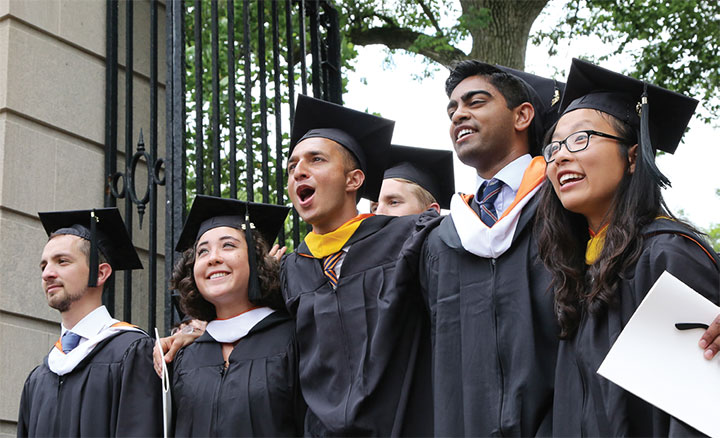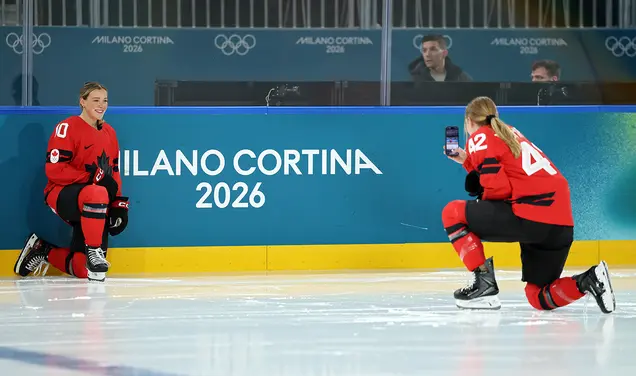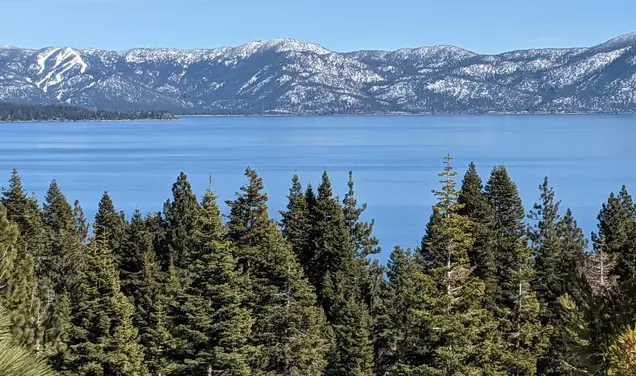Reclaiming Our Civic Culture
In a few minutes, all of you will march through FitzRandolph Gate as newly minted graduates of this University. Before you do, it is my privilege to say a few words to you about the path that lies ahead.
Your journey from this historic front campus will begin with trumpets, cheering, and happy celebration. It is tempting to send you off with a wish that such high spirits will mark all of your future endeavors, but doing so would ignore the challenges that are evident all around us and, frankly, it would sell you short. The world you enter is, in too many places, troubled and turbulent, fraught with disturbing amounts of anger, resentment, and violence. The world that awaits you will sometimes be frustrating and difficult, but it is a world that needs your talents, your citizenship, and your engagement.
Here in the United States, we find ourselves in the midst of a shockingly coarse presidential election campaign occurring at a time when politics has become strikingly polarized. Americans increasingly live in what might be called ideological silos.
For example, according to the Pew Charitable Trusts, in 1994—right around the time that most of you were born—“23 percent of Republicans were more liberal than the median Democrat[, and] 17 percent of Democrats were more conservative than the median Republican.” Today, by contrast, the overlap of the parties has dwindled to almost nothing. Only 4 percent of Republicans are more liberal than the median Democrat, and only 5 percent of Democrats are more conservative than the median Republican. Pew also reports that political partisans increasingly dislike one another and prefer to live only among people who share their political views.
Two additional findings may be especially dismaying to those of us at colleges and universities. The first is that polarization increases with political engagement. The second is that among politically engaged people, polarization increases with education.
At Princeton, we want you to become engaged, and we obviously want you to be educated. The research I have just mentioned implies that, if we have succeeded, then, all other things being equal, you leave our campus today more polarized and more at odds with one another than when you arrived. According to this logic, we should count ourselves fortunate if, after all this engagement and all this education, you are still willing to sit together long enough to walk out the Gate in the same procession!
Yet, during your time on this campus, you have also had experiences that brought you together and counteracted the polarizing tendencies of our time. You have shared friendships, rivalries, highs and lows, cooperation, competition, and conflict, and these experiences have formed your identities not only as individuals but also as Princetonians. For most of you, your enduring connections to one another and to this University will be one of the most important legacies of your time here.
Over the past few days, you joined thousands of undergraduate and graduate alumni who returned to campus to renew their relationships to one another and this University. Princeton’s alumni are a diverse group—diverse in culture, religious belief, political perspective, gender and sexual orientation, nationality, and career path, to name only a few. Those differences make us stronger, but they can also sometimes be sources of passionate disagreement or even alienation. Yet despite the arguments—indeed, through the arguments—that we sometimes have with one another, Princeton’s alumni form a meaningful community that persists over time. That community, imperfect though it may be, is part of what we celebrate today and throughout this festive weekend.
Your Princeton education has provided you with the intellectual resources required not only to connect with one another but also to resist or reverse the partisanship that so threatens America and the world today. We need people who commit themselves to forging a public culture that enables shared, respectful, and engaged discourse through which we can negotiate differences and address the urgent issues confronting us. Taking up that project will call upon all the resources that your liberal arts education has provided you.
Renewing our civic culture requires many things, not least among them a certain humanistic imagination. I would like to share with you two examples that I believe embody this kind of imagination. My friend Mickey Edwards, who taught for a time in the Woodrow Wilson School, was for many years a Republican congressman from Oklahoma. He had a reputation as an independent thinker and a maverick, the sort of profile that, unfortunately, scarcely exists anymore in the Congress where he once served.
Mickey Edwards became concerned about the polarization that has engulfed Washington and this country. And he decided to confront it. He created a program for up-and-coming state politicians that would encourage them to form relationships across party lines.
Working with the Aspen Institute, Mickey designed a program that features a series of three-day philosophical seminars in which the state politicians read excerpts from the likes of Plato, Confucius, James Madison, Virginia Woolf, Martin Luther King, Jr., and Aung San Suu Kyi. The seminars are intensive, running for about seven hours each day. In the evenings, Mickey brings the politicians to places like Preservation Hall in New Orleans, or to a mountainside cabin near Aspen, where they chow down on comfort food and sing-along to old John Denver songs.
What I like most about Mickey’s idea is its power to realize the critical elements of a residential liberal arts education. He manages to get politicians to step back from short-term arguments about budgets and abortion and taxation, and to focus instead on long-term discussions about ideas and principles that have the potential to unify and define us as a people. At the same time, he enables these politicians to really know one another, not merely as ideological rivals, but as fellow human beings who share experiences beyond the political—human beings who dine together, talk about their families, and take the risk of sounding silly when singing old John Denver tunes.
I don’t know if any of you have harmonized to “Sunshine on My Shoulders”—maybe your parents did— but I expect that your time at Princeton has included seminars where you debated profound ideas, and dinner table conversations with people from a wide variety of backgrounds, places, and, most importantly, perspectives. That is one of the reasons why I hope and believe that many of you have grown together rather than apart even as you became more educated and more engaged.
My second example of humanistic imagination is a cultural miracle that occurs eight times each week at 226 West 46th Street in New York City, where Lin-Manuel Miranda’s Hamilton is performed. The concept for the musical sounds at first like the premise for a Saturday Night Live parody: a hip-hop musical about the first Secretary of the Treasury in which an almost entirely black and Latino cast portrays the American founders and rehearses detailed eighteenth-century policy debates. It is no ordinary musical!
Unlike most musicals, Hamilton is selfconsciously and unabashedly political, and, unlike most things political, it appeals powerfully to both sides of the ideological spectrum. Wall Street Journal columnist Peggy Noonan, a former speechwriter for Ronald Reagan, calls Hamilton “a masterpiece.” Michelle Obama ’85 calls it “the best piece of art in any form that I have ever seen in my life.” Her husband, President Barack Obama s’85, has said that “Hamilton, I’m pretty sure, is the only thing that Dick Cheney and I agree on.”
Lin-Manuel Miranda has thus done something that neither our politicians nor our current Supreme Court seem capable of doing, namely, he has produced an intelligent and inspirational account of the American founding that transcends political lines. With dazzling insight and artistic courage, he has reenvisioned America’s history and thereby strengthened America’s present.
We have had our own struggles with history at Princeton. We have spent a lot of time this year reckoning with Woodrow Wilson’s racism and, more broadly, with this University’s exclusionary past. Some people have told me that they regard these discussions as a distraction. The most meaningful and important questions, these people say, are about the present and the future, not about the past.
But to decide collectively, indeed, as a community, about our future, we need to understand one another. We need to be able to see other people’s points of view, and we must forge shared spaces for disagreement and deliberation. And understanding one another requires, among other things, finding new ways to comprehend the history that has affected, and continues to affect, different groups and individuals in different ways.
Lin-Manuel Miranda has given us a brilliant example of how that can be done. You emerge from Hamilton seeing America’s founding and America’s identity differently, even if, like me, you have been studying those subjects for decades. You emerge with new ways, if you want them, of claiming America’s past as your own.
As a constitutional scholar, my only serious quarrel with Hamilton is that it depicts James Madison, Class of 1771, as little more than a meek sidekick to Thomas Jefferson. Perhaps Madison deserves his own musical— one that would provide new perspectives upon a complex man who was simultaneously a slaveholder and also the principal draftsman of the American Constitution and its Bill of Rights.
I hope that one of you will write Madison’s musical. More broadly, I hope that all of you will seek to participate in acts of humanistic daring, imaginative invention, and creative construction like those of Mickey Edwards and Lin-Manuel Miranda. As Professor of Politics Chris Achen observed to me in a recent exchange about these very issues, a country’s constitutional institutions depend on the constitutional culture that supports them. America’s constitutional culture is in distress, and it will take leadership and engagement from all of us to repair it.
That may seem a tall order. Few if any of us can match the wit or genius of Miranda’s Hamilton. Yet, as Mickey Edwards’s seminar series demonstrates, in the right time and the right place, even a brief John Denver sing-along can make a difference. I am confident that your Princeton education has provided you with the humane resources needed to design other imaginative responses to the challenges facing civil society today.
My colleagues and I here on stage look forward to cheering you on as you address these and other challenges. We hope that all of you will return often to Old Nassau and update us on your progress. We are proud of you, we will miss you, and we eagerly anticipate seeing what you will achieve, because all of you are now, and forever shall be, part of Princeton’s Great Class of 2016!
Congratulations and best wishes!













No responses yet